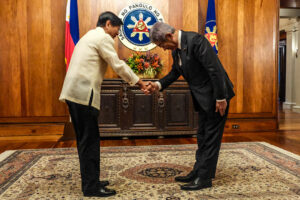More than a week after hearing the lecture of a China studies expert on what will likely take place this year in the West Philippine Sea (WPS), I cannot help going back to the events of 2024 and affirming that this is indeed how things are shaping up.
During last week’s forum on the strategic cooperation between Japan and the Philippines, organized by The Stratbase Institute in cooperation with the Embassy of Japan in the Philippines, Dr. Shin Kawashima of the University of Tokyo said that China will continue its aggressive operations in the WPS as well as in the Senkaku Islands and Taiwan throughout 2025.
“China will not stop their operations. Maybe they will slow down temporarily but from a long-term view, China will not stop, especially given their strong strategy to go beyond the First Island Chain,” he said.
He added that China will take its cue from how the new Trump administration — inaugurated this week — conducts itself and whether it will adopt a soft or hard approach. Whatever the manner, all this is in congruence with the so-called China Dream of Chinese Premier Xi Jinping. It will be in pursuit of the unilateral creation of a new world order by challenging the existing order, as a result of fundamental disagreements with the United Nations, international law, Western values, and the US-led security alliance.
It is not at all difficult to imagine this direction given the events that transpired in our territory in 2024. China escalated tensions through actions like military-grade laser targeting and ramming Philippine Coast Guard vessels and swarming the Senkaku Islands with Chinese government ships. Additionally, in the same year, over 3,000 Chinese military aircraft breached Taiwan’s Air Defense Identification Zone, setting another new record.
During the forum, Japanese Ambassador to the Philippines Endo Kazuya also talked about the many reasons why Japan and the Philippines have to take their relationship to a new level.
“Regional deterrence has never been more critical to ensuring peace and stability of the region. As Japan and the Philippines face similar maritime challenges, we as national and key strategic partners are not only responding to the evolving complexities of regional security, but also building a framework that supports long-term stability and growth. In addition to security, our two countries also have strong economic complementarities,” he said.
The two countries must redouble their current efforts, he said, to face the severe and complex security challenges. Like the Philippines, Japan has demonstrated its commitment to a peaceful resolution of disputes.
Just last month, the Philippine Senate unanimously ratified the Reciprocal Access Agreement (RAA) between the Philippines and Japan. The RAA strengthens cooperation between the Armed Forces of the Philippines and the Japan Self-Defense Forces, facilitating joint exercises like Balikatan, Kamandag, and Sama-Sama.
The RAA, which eases the entry of equipment and troops for combat training and disaster response, will allow both military forces to deploy on each other’s soil. This is the first such agreement that Japan has signed in Asia.
At this crucial juncture in our contemporary affairs, we are fortunate to have leaders who are more engaged than ever and more actively participative in dialogue. They are open to new agreements and committed to forging partnerships that strengthen collective efforts in addressing regional threats.
In fact, this administration has the burden of undoing the harmful consequences of its immediate predecessor’s licentious policy toward China, which was on full display for six full years. We are also fortunate that like-minded countries like Japan are willing to extend more than cooperation but genuine friendship. Furthermore, we are able to strengthen our own capabilities against threats to our integrity, and on a broader scope, to uphold peace and stability in the Indo-Pacific region.
The Philippines, Japan, or any country in the world for that matter, or any bloc or organization, have no control over China’s national aspirations and visions of its future. If it sees itself as a formidable world power, or disrupting the existing rights-based international order, one that is based on the respectful acknowledgment of each country’s rights, then it can try to portray itself as such. Where the rest of the Indo-Pacific region can do something is in responding peacefully, diplomatically, and yet firmly and robustly, to its provocative actions.
Deep and lasting cooperation, like the one enjoyed and treasured by the Philippines and Japan, is crucial to ensuring a future of peace and security in our respective countries and in the Indo-Pacific region. Thus, while we expect more challenges arising from China’s actions this year, we will also take comfort in the fact that we are aligned with nations and peoples who share our values and commitment to what is right and just.
We celebrate the RAA and the resounding message it carries — that the Philippines and Japan will stand resolute in the Indo-Pacific region, undeterred by those who seek to challenge the established order. But we also celebrate the friendships and alliances with countries with whom we share challenges, yes, but moreover an unwavering determination to uphold peace, stability, and the rule of law.
Victor Andres “Dindo” C. Manhit is the president of the Stratbase ADR Institute.

